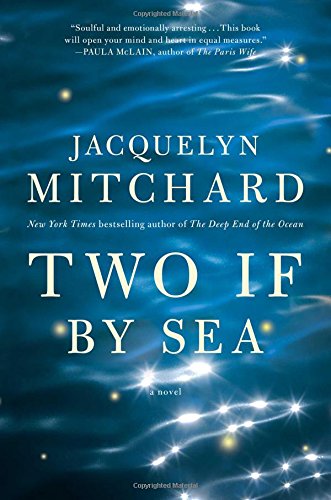Books |
Two If by Sea
Jacquelyn Mitchard
By
Published: Apr 20, 2016
Category:
Fiction
In 1996, I co-founded the book site on AOL that is now Bookreporter.com. In 1996, Jacquelyn Mitchard published her first novel, “The Deep End of the Ocean.” Oprah chose it as the first selection for her new book club. I wasn’t totally stupid — I interviewed Mitchard for our site. It was a warm conversation, like talking to a friend.
Remember that book? Someone abducts a three-year-old boy from a Chicago hotel lobby. A nightmare begins for his parents, especially, as you’d expect, for his mother. Later, the boy returns, and a new drama begins. [To buy the paperback of “Deep End of the Ocean” from Amazon, click here.] The novel became a movie, starring Michelle Pfeiffer.
Two decades later, Jacquelyn Mitchard asked me to read her new book, “Two If by Sea.” In the press release, I caught up with her life in those two decades. Her family’s financial advisor stole their money and moved to Panama. She and her husband and her nine children moved to a small house on Cape Cod. She teaches. She kept writing.
If I ever wanted to like a book, this is it.
I do like “Two If by Sea.” Very much. With all the reservations I have for any novel that fills 400 pages and would be so much more satisfying at 300. That’s my hobby horse. But book clubs will love it.
Like all good novels, “Two If by Sea” works on two levels. There an exciting adventure story. And beneath that is a meditation on family, loss and recovery.
The book starts in Australia, with a wave: “a gleaming dam, built of stainless steel, standing upright in the misty moonlight, fifty feet tall and extending for half a mile in either direction. then, as it collapsed in place, it was water, surging forward and drowning every building on the beach, including the Murray Sand Castle inn, where Frank’s pregnant wife and her entire extended family lay asleep.”
Frank, in his truck, is the sole survivor of a massacre. He’s 42, retired on disability from the Chicago police, where he rode a horse and killed no one. He’s a realist — he knows he’s lost two-thirds of his life. But his training kicks in, and he tries to help survivors. He’s modestly successful; in his efforts to save a family in a rapidly sinking van, he manages to save only a three-year-old boy.
He keeps the boy. Takes him back to the United States, starts training horses. Bucolic? No. Ian is not like other children. He has a gift. He can say “Be nice” and animals and humans alike become peaceful. Essentially, he can see the human heart. And predict the future. If you flash to the D.H. Lawrence story, The Rocking Horse Winner, give yourself a pat on the back.
A woman will appear, and Frank will have to decide if he can deal with her. More to the point, evil appears — someone is stalking the boy. People will die. Frank will have to connect the dots. That’s a great story. And powerfully written. [To buy the book from Amazon, click here. For the Kindle edition, click here. For the audio book, click here.]
The book isn’t helped, though, that Frank’s last name is Mercy. Or that his dead wife was chief of emergency services at a hospital named Our Lady Help of Christians. Or that the part of Evil is played by a guy who’d be more at home as the villain of a James Bond movie. I understand why Serious Writers make these choices. I will go to my grave wondering why their agents and editors don’t urge them to turn back.
No matter. The novel begins with “the audacity of fate’s disregard for logical progression.” It presents “the horror of witness embedded in the urgent banalities of ordinary life.” It acutely tracks a man’s recovery from “his own unspeakable.” And, long before the end, it’s a love story that kept me reading long after I should have turned off the lights.
BONUS: audio of the first chapter


